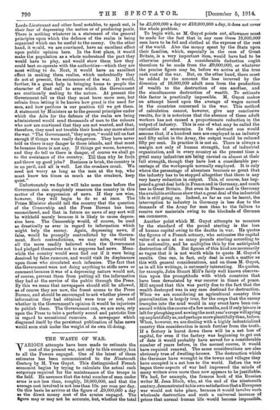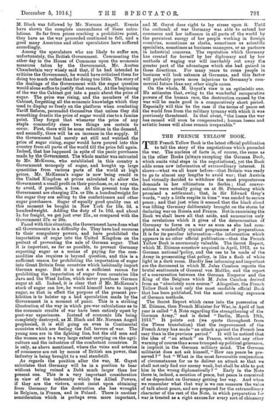THE WASTE OF WAR.
-VARIOUS attempts have been made to estimate the cost of the present war, not only to this country, but to all the Powers engaged. One of the latest of these estimates has been communicated to the Nineteenth Century by M. Yves Guyot. This distinguished French economist begins by trying to calculate the actual cash outgoings required for the maintenance of the troops in the field. He assumes that the total number of men under arms is not less than, roughly, 18,000,000, and that the average cost involved is not less than 10s. per man per day. On this basis he arrives at the figure of £9,000,000 a day as the direct money cost of the armies engaged. The figure may or may not be accurate, but, whether the total be £5,000,000 a day or £10,000,000 a day, it does not cover the whole problem.
To begin with, as M. Guyot points out, allowance must be made for the fact that in any case these 18,000,000 men have to be fed and clothed at the expense of the rest of the world. Also the money spent by the State upon their families, which, especially in the case of Great Britain, is a very important item, would have had to be otherwise provided. A considerable deduction ought therefore to be made from the £9,000,000, or whatever the precise figure may be, before we arrive at the true cash cost of the war. But, on the other hand, there must be added to the account the loss incurred by the diversion of 18,000,000 adult men from the production of wealth to the destruction of one another, and the simultaneous destruction of wealth. To estimate this factor is practically impossible. M. Guyot makes an attempt based upon the average of wages earned in the countries concerned in the war. This method of calculation cannot, however, give any conclusive results, for it is notorious that the absence of these adult workers has not caused a proportionate reduction in the output of industry. This is one of what may be called the curiosities of economics. In the abstract one would assume that, if a hundred men are employed in an industry and fifty enlist in the Army, the output would be reduced fifty per cent. In practice it is not so. There is always a margin not only of human strength, but of industrial organization, and in every country at the present time a. great many industries are being carried on almost at their full strength, though they have lost a considerable per- centage of the workpeople normally employed. It is only where the percentage of absentees becomes so great that the industry has to be stopped altogether that there is any very heavy reduction in output. This, of course, has hap- pened a great deal both in France and in Germany, and much less in Great Britain. But even in France and in Germany the available evidence show that a great deal of the industrial life is still going on. Indeed, as far as can be learnt, the interruption to industry in Germany is less due to the demands of the Army for men than to the failure to receive raw materials owing to the blockade of German sea commerce.
Another point which M. Guyot attempts to measure by the standard of the pound sterling is the loss of human capital owing to the deaths in war. He quotes the figures of a French actuary, who estimates the capital value of a man at so many pounds sterling according to his nationality, and he multiplies this by the anticipated destruction of life. But figures of this kind are necessarily so vague that it is not worth while to quote M. Guyot's results. One can, in fact, only deal in such a matter as this with general considerations, and on these M. Guyot, as in all his writings, is extremely interesting. He quotes, for example, John Stuart Mill's fairly well known observa- tion upon the promptitude with which countries that have been devastated by war recover in times of peace. Mill argued that this was partly due to the fact that the wealth destroyed was in any case destined for destruction. When we are considering an agricultural country this generalization is largely true, for the crops that the enemy tramples into the mud would in any event have been con- sumed within the course of a few months, and if only leisure is left for ploughing and sowing the next year's crops will spring up as plentifully as, and perhaps more plentifully than, before. When, however, we are dealing with a, highly industrialized country this consideration is much further from the truth. If a factory is burnt down there will be a net loss of capital, for even if the factory was beginning to get out of date it would probably have served for a considerable number of years before, in the normal course, it would have required renewal. The same considerations are also obviously true of dwelling-houses. The destruction which the Germans have wrought in the towns and villages they have occupied is a net loss to the world. Before the war began these aspects of war had impressed the minds of many writers even more than now appears to be justifiable. We had, for example, the famous book of the Russian writer M. Jean Bloch, who, at the end of the nineteenth century, demonstrated to his own satisfaction that a European war would not take place, because it would involve such wholesale destruction and such a universal increase of prices that normal human life would become impossiblb. M. Bloch was followed by Mr. Norman Angell. Events have shown the complete unsoundness of these calcu- lations. So far from prices reaching a prohibitive point, they have as the war proceeded continued to fall, and a good many American and other speculators have suffered accordingly.
Among the speculators who are likely to suffer are, unfortunately, the British Government. Commenting the other day in the House of Commons upon the economic measures taken by the Government, Mr. Austen Chamberlain very wisely said that, if he had intended to criticize the Government, he would have criticized them for doing too much rather than for doing too little. The story of the dealings of the Government with the sugar question would alone suffice to justify that remark, At the beginning of the war the Cabinet got into a panic about the price of sugar. The price was rising, and the members of the Cabinet, forgetting all the economic knowledge which they used to display so freely on the platform when combating Tariff Reform, persuaded themselves that unless they did something drastic the price of sugar would rise to a famine point. They forgot that whenever the price of any staple commodity rises two things are certain to occur. First, there will be some reduction in the demand, and secondly, there will be an increase in the supply. If the Government had merely sat still and watched the price of sugar rising, sugar would have poured into this country from all parts of the world till the price fell again. Indeed, that has happened in spite of the panic purchases made by the Government. The whole matter was entrusted to Mr. McKenna, who established in this country a Government monopoly of sugar, and bought up large quantities from various parts of the world at high prices. Mr. McKenna's sugar is now being resold in the United Kingdom at prices calculated to allow the Government a small profit on their purchase, or, at any rate, to avoid, if possible, a loss. At the present time the Government are charging 27s. or 28s. a hundredweight for the sugar they are selling to the confectioners and other sugar purchasers. Sugar of equally good quality can at this moment be bought in New York for 18s. 3d. a hundredweight. Adding the duty of ls. 101 and about is. for freight, we get just over 21s., as compared with the Government 27s. or 28s.
Faced with this situation, the Government have done what all Governments in a difficulty do. They have had recourse to their compulsory powers, and have prohibited the importation of sugar into the United Kingdom on the pretext of preventing the sale of German sugar. That it is important, as far as possible, to prevent Germany exporting sugar as a means of paying for the com- modities she requires is beyond question, and this is a sufficient reason for prohibiting the importation of sugar into Great Britain from countries which habitually import German sugar. But it is not a sufficient reason for prohibiting the importation of sugar from countries like Java and the West Indies, which never purchase German sugar at all. Indeed, it is clear that if Mr. McKenna's stock of sugar ran low, be would himself have to import sugar, so that in effect the purpose of the present pro- hibition is to bolster up a bad speculation made by the Government in a moment of panic. This is a striking illustration of the way in which pre-war calculations as to the economic results of war have been entirely upset by post-war experiences. Instead of economic life being completely destroyed, as M. Bloch and Mr. Norman Angell prophesied, it is still going on even in Continental countries which are feeling the full terrors of war. The young men are in the fighting line, but the old men and the women are to a very large extent carrying on the agri- culture and the industries of the combatant countries. It is only, as above mentioned, where the veins and arteries of commerce are cut by means of British sea power, that industry is being brought to a real standstill. As regards the position after the war, M. Guyot calculates that Germany will be in a position to bear without being ruined a Debt much larger than her present one. This is a very important consideration in view of the indemnity which the Allied Powers, if they are the victors, must insist upon obtaining from Germany for the destruction she has wrought in Belgium, in France, and in Poland. There is another consideration which is perhaps even more important, and M. Guyot does right to lay stress upon it. Until the outbreak of war Germany was able to extend her commerce and her influence in all parts of the world by the persistent energy of her people working in foreign countries, sometimes as clerks, sometimes as scientific specialists, sometimes as business managers, or as partners in industrial concerns. The reputation which Germany has created for herself by her diplomacy and by her methods of waging war will inevitably cut away the greater part of the advantages which she had gained in these directions. For many years to come people in business will look askance at Germans, and this factor will probably prove more injurious to Germany's com- mercial future than any other single cause.
On the whole, M. Guyot's view is an optimistic ono. He estimates that, owing to the wonderful recuperative powers of the human race, the destruction caused by the war will be made good in a comparatively short period. Especially will this be the case if the terms of peace set the world free from the military tyranny with which it was previously threatened. In that event, " the losses the war has caused will soon be compensated ; human losses and artistic losses will alone remain irreparable."



























































 Previous page
Previous page